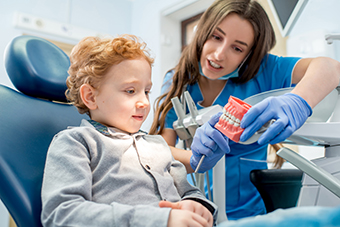 05 Mar 2023
05 Mar 2023
If you think your child is too young to worry about cavities, think again. Tooth decay can set in as soon as your child has a single tooth in their mouth.
While baby teeth eventually fall out and composite fillings can repair most of the damage that decay causes, it is still important to keep your children’s teeth healthy. Dental decay can cause severe pain and lead to life-threatening infections. Our guide will help you protect your child’s teeth from decay and set them up for better dental health for life.
Cause of Tooth Decay in Babies
Babies can develop tooth decay the same way adults do. When they consume sugary substances, including formula and breast milk, the bacteria in their mouths break those substances down into acids. These acids eat away at their tooth enamel and eventually cause tooth decay.
Babies’ teeth have very thin enamel, so they can develop dental cavities much more quickly than adults. This is especially likely to happen if a baby is given a bottle of milk or formula to take to bed each night. The sugars in the milk stay on their teeth all night, giving their oral bacteria plenty of time to cause damage.
Signs of Tooth Decay in Babies
Tooth discolouration is the most noticeable sign of tooth decay in babies. You may notice patches of yellow, brown, or even black on your baby’s teeth. Milky-looking white spots are also a bad sign. These spots may be signs of one of the earliest tooth decay stages.
Some babies with tooth decay will cry or express pain when their teeth are exposed to hot, cold, or sweet things. However, many do not. Always have a dentist examine your child’s teeth if you spot discolouration, even if they do not seem to be in pain.
How to Prevent Tooth Decay in Babies
- Take care of your baby’s teeth. Every night, wipe down your baby’s gums using a soft, clean cloth. When your baby has teeth, brush them with a soft infant’s toothbrush and a tiny smear of an approved toothpaste for their age. If two or more teeth touch, floss between them.
- Never put your baby to bed with a bottle, sippy cup, or food. Anything they consume during the night will sit on their teeth until morning, creating the ideal environment for bacteria to fester. The only safe thing for them to have overnight is water, as anything else will promote tooth decay.
- Teach your baby to drink from a regular cup as soon as possible. Regular cups cannot be easily carried around, making it less likely that your baby will continually sip from them.
- Limit the amount of sweet, sticky items your child eats and drinks, including juice. The less sugar they are exposed to, the lower their risk of tooth decay.
- Check whether your local water supply is fluoridated. If it is not, your child’s dentist may recommend supplemental fluoride treatments.
When Should Kids Start Brushing Their Teeth?
Most children can start brushing their own teeth as soon as they are able to spit out the toothpaste after – usually around 2 or 3 years old. However, you should supervise your child while brushing until you are confident that they can do it properly on their own. For most children, this will happen when they are around 8 years old.
Cause of Tooth Decay in Young Children
Just like babies and adults, children get tooth decay when the bacteria in their mouth feed on the carbohydrates in their food or drinks.
Young children are particularly vulnerable to decay because many of them eat diets high in sweet or starchy foods. In addition, their oral hygiene is usually not as good as that of adults. They may fail to brush their teeth thoroughly or skip doing it altogether. This is why it is important to supervise their brushing and flossing until they are old enough to do it themselves.
How to Prevent Tooth Decay in Young Children
- Promote Good Habits. Make sure your child understands that it is important to brush their teeth at least twice a day and floss at least once a day. Create a routine that reinforces these habits for them.
- Make Sure Your Child Gets Enough Fluoride. Fluoride strengthens children’s teeth and allows their enamel to develop properly. If your town does not fluoridate its water, your dentist may prescribe fluoride tablets for you to mix with your child’s drinks.
- Limit Sugary Foods. Only give your child sugary foods as treats and give the treats to them with meals whenever possible.
Other Ways to Avoid Tooth Decay in Children
- Being a Role Model. Set a good example for your children by brushing and flossing daily, limiting your own sugar intake, and visiting the dentist with them regularly.
- Asthma Inhalers. If your child uses an inhaler, the powder in the inhaler may be exposing their teeth to acids that promote tooth decay. To prevent this, have your child swish their mouth out with water each time they use their inhaler. After 60 minutes have passed, have them brush their teeth.
- Medicines. Some medicines contain sugar to make them more palatable to ingest. Check the ingredients list of all medications your child takes for hidden sugars, and ask your pharmacist for sugar-free alternatives whenever you can. If your child must take medication that contains sugar, have them swish water around their mouth immediately afterwards and brush their teeth one hour later.
- Sports Drinks. Many sports drinks contain acids and sugars that promote tooth decay. Offer your child water instead of sports drinks whenever possible – it will quench their thirst without putting their teeth at risk.
For a Healthy Mouth at Any Age, Visit Trillium Smile Dentistry

Visiting the dentist every six months for a cleaning and check-up is a vital part of any oral health routine. Get your children used to these visits early by visiting our friendly staff here at Trillium Smile Dentistry. We will be happy to examine your child’s teeth for signs of decay, schedule them for white composite fillings to repair any damage we spot and give you tips on how to avoid future decay. Contact us today to book an appointment for your child and get them the quality oral health care they need to thrive.
Also Read:
